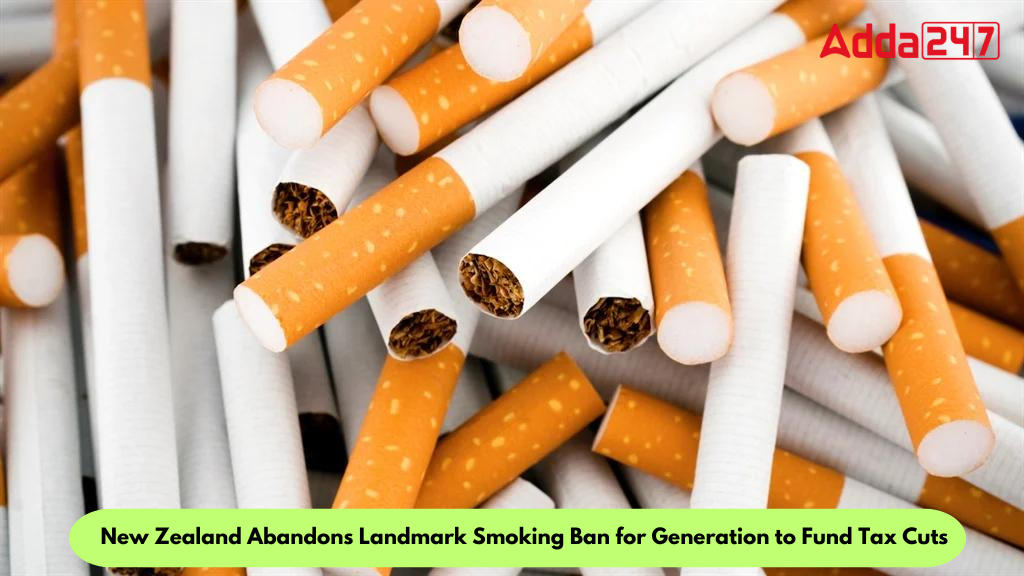New Zealand’s recently elected government has decided to abandon its groundbreaking law aimed at banning smoking for future generations. The move is driven by the government’s intention to finance tax cuts, but public health officials are expressing concerns about the potential consequences, foreseeing thousands of lives at risk, especially within Māori communities. The 2022 legislation, considered a world-first, established a progressively increasing smoking age, preventing those born after January 2009 from legally purchasing cigarettes. The primary goal was to curtail smoking-related fatalities and alleviate the strain on the health system.
The abandonment of New Zealand’s world-first smoking ban for future generations raises concerns about the balance between economic considerations and public health priorities. As the government pivots towards tax cuts, the potential consequences on smoking-related mortality rates and health system costs remain a subject of intense debate and scrutiny both domestically and internationally.
Details of the Legislation:
The 2022 legislation not only implemented the innovative smoking age but also incorporated additional measures to make smoking less accessible and affordable. Key components included a significant reduction in the legal nicotine content in tobacco products, exclusive sales through specialized tobacco stores, and a drastic reduction in the number of outlets permitted to sell cigarettes – from 6,000 to a mere 600 nationwide.
Implementation Timeline:
Originally set to take effect from July 2024, the laws faced a sudden reversal due to the coalition agreement between the governing party and populist New Zealand First. The agreement led to the repeal of crucial amendments, including the removal of de-nicotisation requirements, the restoration of the original number of retail outlets, and the abandonment of the generation ban.
Health Impact Concerns:
Public health officials, including Dr. Lisa Te Morenga, expressed concerns over the potential impact of this decision. Recent modeling studies indicated that the regulations, if fully implemented, could save $1.3 billion in health system costs over the next two decades. Furthermore, mortality rates were projected to decrease by 22% for women and 9% for men.
Criticism and Reversal Rationale:
Critics argue that the decision to abandon the smoking ban demonstrates a prioritization of tax cuts over public health, with potentially catastrophic consequences. The reversal is seen as contradicting global efforts to reduce smoking rates and may undermine New Zealand’s influence, especially considering that its original legislation served as inspiration for a similar plan in the United Kingdom.
Important takeaways for all competitive exams:
- New Zealand President: Christopher Luxon;
- New Zealand Capital: Wellington;
- New Zealand Currency: New Zealand dollar.
Important Questions Related to Exams
1. Why did New Zealand’s government decide to abandon the law aimed at banning smoking for future generations, and what concerns have arisen as a result?
Solution: The New Zealand government abandoned the smoking ban law to finance tax cuts. Public health officials are concerned about the potential consequences, foreseeing risks to thousands of lives, especially within Māori communities.
2. What were the primary goals of the 2022 legislation in New Zealand regarding smoking, and how did it plan to achieve them?
Solution: The primary goals were to prevent smoking-related fatalities and alleviate the strain on the health system. The legislation implemented a progressively increasing smoking age, preventing those born after January 2009 from legally purchasing cigarettes, and included measures to make smoking less accessible and affordable.
Find More International News Here



 Zelenskyy and Estonia’s New PM Discuss...
Zelenskyy and Estonia’s New PM Discuss...
 Ronald L. Rowe Jr. Named Acting Chief of...
Ronald L. Rowe Jr. Named Acting Chief of...
 Rahaab Allana Honored with French Arts a...
Rahaab Allana Honored with French Arts a...
